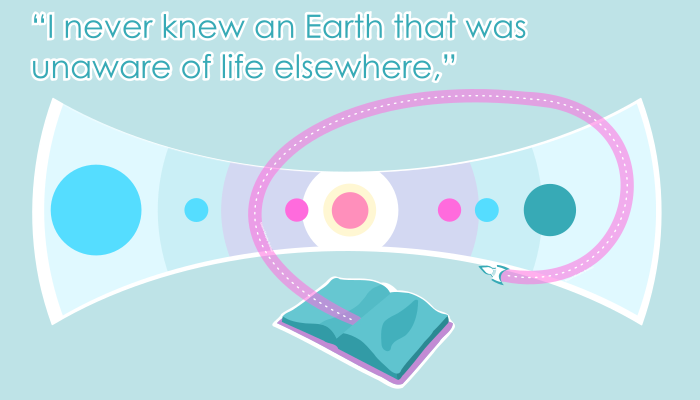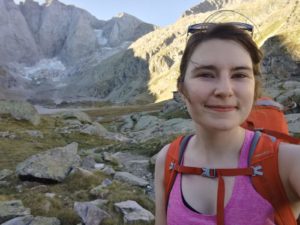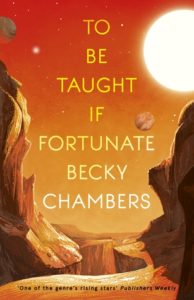
You know what has been missing from this blog so far? Book reviews! This week, Maeve Murphy Quinlan, PhD student at the University of Leeds, United Kingdom studying meteorites, comes to our rescue and discusses the science fiction genre with a review and recommendation of the novella To be Taught, if Fortunate. I know what’s next on my reading list.
 What is science fiction? It is a wide-ranging genre within speculative fiction that usually involves futuristic technological advances and often involves space travel. It can range from entirely fantastical, set in universes completely separate from our own with very little resemblance to our reality, or can be quite “realistic”, mapping our world onto a slightly more advanced, futuristic vision. Just like any other genre of fiction, it may reinforce harmful entrenched stereotypes (as does the underlying publishing industry), may insensitively steal from cultures, and can espouse very uncomfortable and colonial ideals (especially when introducing alien planets) – but can also subvert these ideals or present them as a dystopian system (to varying levels of success).
What is science fiction? It is a wide-ranging genre within speculative fiction that usually involves futuristic technological advances and often involves space travel. It can range from entirely fantastical, set in universes completely separate from our own with very little resemblance to our reality, or can be quite “realistic”, mapping our world onto a slightly more advanced, futuristic vision. Just like any other genre of fiction, it may reinforce harmful entrenched stereotypes (as does the underlying publishing industry), may insensitively steal from cultures, and can espouse very uncomfortable and colonial ideals (especially when introducing alien planets) – but can also subvert these ideals or present them as a dystopian system (to varying levels of success).
When done right, science fiction can spark the imagination, can ignite curiosity in the natural world, and can encourage people to seek out real science that is happening right now or maybe even inspire the reader to pursue science as a career or lifelong interest. These books or films can also be inspiring to people already working in the field, reminding them why they chose this path and why they found their work engaging and interesting to begin with. Earth and planetary scientists have had a mixed bag with this – on one hand, we get supplied with an unending repertoire of geo-disaster films of varying and questionable quality, on the other, we get books and films such as The Martian, which was lauded for at least it’s accuracy in the approach to problem solving and science, if not for getting every detail correct. Sometimes, rarely, as a planetary scientist, you stumble across a piece of fiction that perfectly encapsulates the hopeful aspirations you have for your field and takes your breath away at the attention paid to building a plausible scientific system on top of existing knowledge – To be Taught, if Fortunate falls firmly within this category (and for me is perhaps the only member in this admittedly extremely specific and niche group).

To be Taught, if Fortunate was published by Hodder & Stoughton in 2019 and was nominated for the Hugo Award for Best Novella in 2020.
To be Taught, if Fortunate is a science fiction novella written by Becky Chambers, author of the Hugo Award winning Wayfarer series. This short and simple story, very different to her previous series, is written as a letter back to Earth detailing the scientific expedition of Ariadne and her crewmates as they carry out an ecological survey of four habitable exoplanets. While Chambers is not a scientist herself, the attention to detail and meticulous research she has conducted to weave a stunningly believable universe is impressive – the acknowledgements section at the end is a testament to this, listing the astrobiologists and integrative biologists (I didn’t know what that even meant until reading this book) she interviewed and consulted while writing.
Ariadne lives in a future version of our world where extra-terrestrial life is an established fact following the discovery of bacteria in Europa’s geysers. Space travel in this world is an egalitarian activity: missions are citizen funded, organised by the OCA. The OCA or Open Cluster Aeronautics, an “apolitical, international, non-profit” group, was founded after a quiescence in space travel due to tumultuous environmental, social and political upheaval during the 2020s (believe me, this hit differently on rereading now than when I first read it in 2019). The crew aboard the Merian spacecraft are diverse, with thoughtful and tender character development despite the brevity of the story and the breadth of the concepts and planets visited.
And those concepts and planets! The range of exoplanets visited will delight anyone with an interest in comparative planetology and geodynamics – which let’s be real, you must have, otherwise why would you be reading this blog post? The crew’s mission involves four exoplanets, an icy moon and three rocky worlds, all orbiting a red dwarf. The novella employs fantastically novel approaches to dealing with the hostile environments of such different planets, including adaptive biology called somaforming where the astronauts are transformed to better suit the conditions of their temporary host worlds. This is one aspect of an underlying theme that runs through the book: the ethics of planetary exploration. Ariadne notes
I’m an observer, not a conqueror. I have no interest in changing other worlds to suit me.
This approach, so different from much of the (real) history of spaceflight, presents some important food for thought on how we interact with planetary bodies as explorers within our own solar system, and further afield.
Each planet is distinctive: the dynamics and ecosystem of each world are beautifully detailed and completely plausible, without falling into the trap of endless exposition that “hard” science fiction falls prey to. Like the characters, despite their presence being brief in this short novella, they make an impact and feel fully fleshed out. Each planet has distinct geology (exo-geology?) that in turn has helped to shape the life that has evolved on it, and informs how the crew undertake their studies.
Another interesting topic that Chambers raises is the idea of balancing or prioritising one form or area of research over another: in the world of this novella, curiosity-driven research and planetary exploration was shelved for a period of time while the world grappled with climate catastrophe and ecological disaster. This is presented sympathetically by Ariadne, who asks “how can anyone be expected to care about the questions of worlds above when the questions of the world you’re stuck on – those most vital criteria of home and health and safety – remain unanswered?” On a smaller scale, this quote seems particularly relevant to trying to conduct meteoritic research from home in the midst of a global pandemic, but I digress. There is also a succinct but strong criticism of space flight funding in the past – our present – world, describing the geopolitical and capitalistic forces underpinning both governmental and private space exploration ventures, and how these foundations are often so at odds with the ideals of the scientists, engineers, lab technicians and data analysts who have a vision of discovery and progress.
All of this backstory and world-building is deftly interwoven with the practicalities of deep space travel (like clipping your overgrown fingernails on waking from years of suspension), the day-to-day of life on a base on an alien world, and the wonder of new discoveries. Current and real astrobiology research forms the basis of the ecological studies conducted by the crew; comparative planetology and geophysics guide their choice of landing sites, equipment, and biological modifications. Space, in To be Taught, if Fortunate, is both beautiful and awe-inspiring but also at times scary, cold, unwelcoming and dangerous – it highlights some of the realities and difficulties of travelling so far away from our home planet. The original term for science fiction, “scientific romance” feels appropriate for this book – it’s a love letter to planetary science and exploration, warts and all.
The somewhat odd title of this novella is taken from a speech given by the United Nations Secretary General, Kurt Waldheim, recorded as the opening to the Golden Record that was launched to space aboard the Voyager spacecraft. “We step out of our solar system into the universe seeking only peace and friendship, to teach if we are called upon, to be taught if we are fortunate. We know full well that our planet and all its inhabitants are but a small part of this immense universe that surrounds us and it is with humility and hope that we take this step.” This rousing speech and the optimistic beacon of peace that was the Voyager mission are tarnished by the fact it was later revealed that Kurt Waldheim was involved in Nazi war crimes, but a cynic may note that it is a fitting reminder of the uncomfortable history of space flight that is frequently brushed over, often built on racist and colonial foundations. While the book never touches on this history with relation to the title explicitly, it does represent an anti-colonial outlook for future planetary science; a future that is well aware of its history and that strives to do better.
To be Taught, if Fortunate presents an aspirational, utopian version of space exploration where curiosity and the desire to discover are balanced with respect and consideration; similar in many ways to the themes represented in Star Trek. It may be science fiction for now, but it’s a future we can work towards from today.
